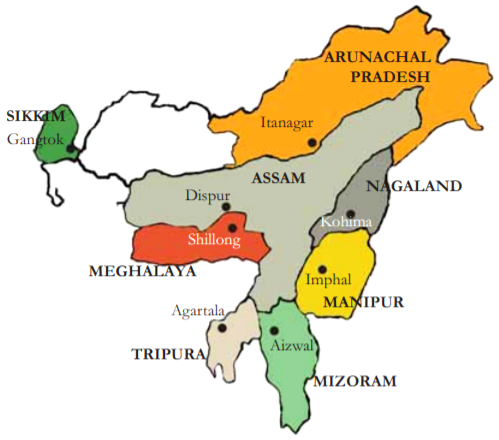Internal Security
Peace in North East India
- 20 Dec 2022
- 6 min read
For Prelims: North East India, Key Agreements in North East India, Armed Forces Special Powers Act, Operations to Bring Back Indians in Distress
For Mains: Key Peace Developments in North East India, Significance of North East India, Initiatives for Development of North East India
Why in News?
Recently, the Union Government has reported that there has been an 80% decline in civilian deaths and 6,000 militants have surrendered in North East India since 2014.
What are the Key Peace Developments in North East India?
- Important Agreements:
- Assam-Meghalaya Inter State Boundary Agreement, 2022:
- The agreement is for a closure in six disputed sectors that were taken up for resolution in the first phase.
- While Assam will get 18.51 sq. km of the disputed areas, Meghalaya will get the remaining 18.28 sq.km.
- Karbi Anglong Agreement, 2021:
- Karbi Anglong Agreement is a tripartite agreement among five insurgent groups of Assam, the Centre and the state government.
- 5 militant organizations (KLNLF, PDCK, UPLA, KPLT and KLF) laid down arms and more than 1000 of their armed cadres have given up violence and joined the mainstream of society.
- Bodo Accord, 2020:
- The central government, the Assam government and the Bodo groups, including all factions of the militant National Democratic Front of Bodoland (NDFB), signed the Bodo Accord to redraw and rename the Bodoland Territorial Area District (BTAD) as the Bodoland Territorial Region (BTR), in Assam.
- Bru-Reang Agreement, 2020:
- Bru or Reang is a community indigenous to Northeast India, living mostly in Tripura, Mizoram and Assam. In Tripura, they are recognised as a Particularly Vulnerable Tribal Group.
- The Centre, the governments of Mizoram and Tripura and leaders of Bru organisations signed the quadripartite agreement, Bru-Reang Agreement in January (2020).
- Under the pact, the Home Ministry has committed to incur the whole expenditure of settlement in Tripura.
- NLFT-Tripura Agreement, 2019:
- National Liberation Front of Tripura (NLFT) has been banned under the Unlawful Activities (Prevention) Act, 1967 since 1997 and has been involved in violence, operating from their camps across the international border.
- NLFT Agreement 2019 resulted in the surrender of 88 cadres with 44 weapons.
- Roll Back of Armed Forces Special Powers Act (AFSPA):
- Government withdrew AFSPA from a large part of the Northeast, including the whole of Tripura and Meghalaya.
- In Arunachal Pradesh, AFSPA remains in force in only 3 districts.
- Government withdrew AFSPA from a large part of the Northeast, including the whole of Tripura and Meghalaya.
- Assam-Meghalaya Inter State Boundary Agreement, 2022:
What is the Significance of North East for India?
- Strategic Significance:
- North-East India is the gateway to South-East Asia and beyond. It is India’s land-bridge to Myanmar.
- India's Act East Policy places the northeastern states on the territorial frontier of India's eastward engagement.
- Cultural Significance:
- North East India is one of the most culturally diverse areas of the world. It is home to over 200 tribes. Popular festivals include the Hornbill Festival of Nagaland, Pang Lhabsol of Sikkim, etc.
- North-east India is a Dowry-Free Zone.
- The rich tapestry of cultures of Northeast is reflected in its highly developed Folk dance forms like Bihu (Assam).
- Manipur has a tradition of worshipping nature in sacred groves, called UmangLai.
- Economic Significance:
- Economically, the Region is rich in natural resources of “TOT” (Tea, Oil, and Timber).
- It is a veritable powerhouse with a potential of 50000 MW of hydroelectric power and an abundant reserve of fossil fuels.
- Ecological Significance:
- North East is a part of Indo-Burma biodiversity hotspot. It represents one of the highest avian and plant biodiversity of the Indian subcontinent.
- This area has the prestige of having all the bear species present in India.
What are the Government's Other Initiatives for the North East?
- Infrastructure:
- Connectivity:
- Kaladan Multi-Modal Transit Project
- India-Myanmar-Thailand Trilateral Highway
- Tourism:
- Other:
UPSC Civil Services Examination, Previous Year Question (PYQ)
Prelims
Q. Which Schedule of the Constitution of India contains special provisions for the administration and control of Scheduled Areas in several States? (2008)
(a) Third
(b) Fifth
(c) Seventh
(d) Ninth
Ans: (b)
Mains
Q1. Human rights activists constantly highlight the fact that the Armed forces (Special Powers) Act, 1958 (AFSPA) is a draconian act leading to cases of human rights abuses by security forces. What sections of AFSPA are opposed by the activists? Critically evaluate the requirement with reference to the view held by the Apex Court. (2015)
Q2. The North-East region of India has been infested with insurgency for a very long time. Analyze the major reasons for the survival of armed insurgency in this region. (2017)





